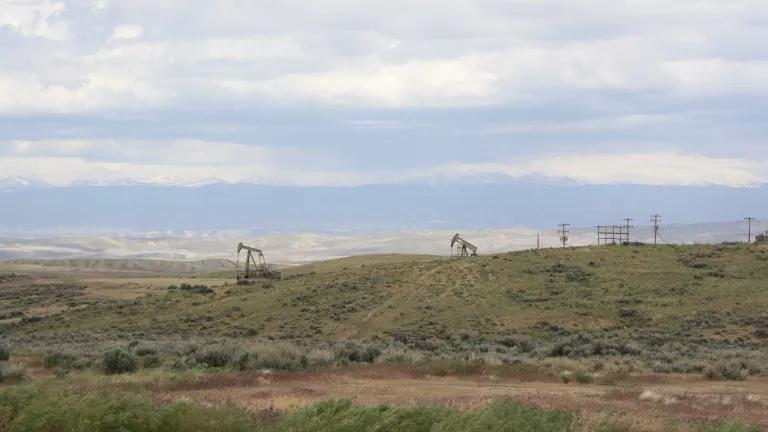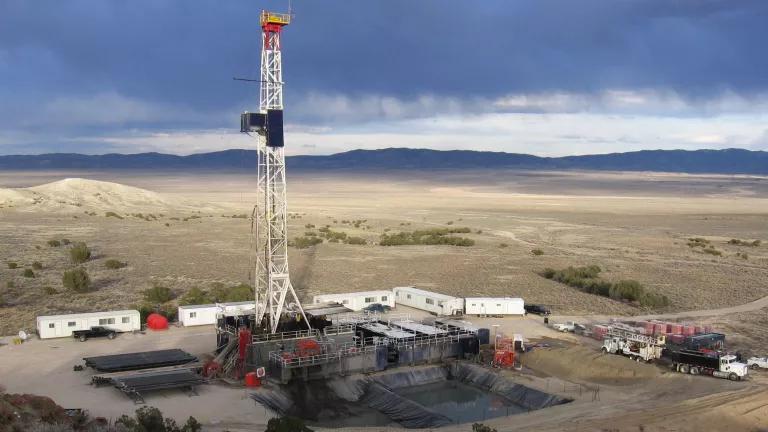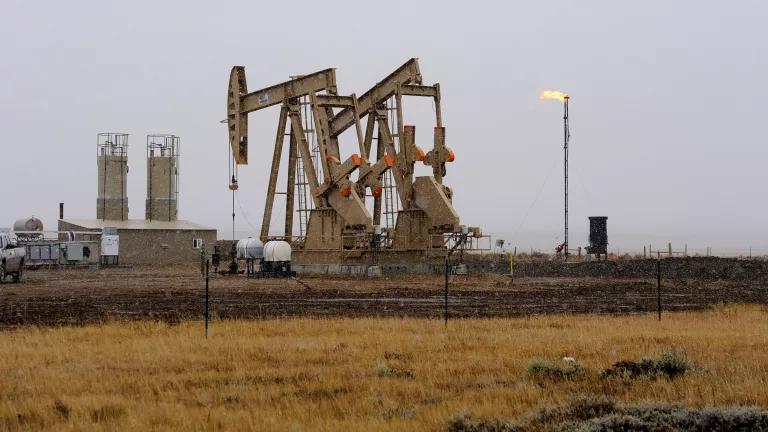Public Lands on Offer to Polluters Again
Amid escalating climate chaos, the Biden administration holds its first onshore oil and gas lease sales since taking office this week.

Pump jacks leased to oil and gas developers fragment habitat on public lands in Wyoming.
Flickr/BLM Wyoming
Since Russia’s unprovoked invasion of Ukraine, energy prices around the world have spiked. Naturally, industry has seized on this moment to once again call for more of everything—more leasing, more permits, more financial supports. But that would accomplish only two things: lining CEO pocketbooks and further destroying the climate. Heeding industry calls won’t bring prices down. And oil and gas companies are awash in profits despite the tens of billions of dollars U.S. taxpayers shell out to oil and gas companies via public subsidies each year. The near-record domestic production isn’t bringing prices down either. Indeed, industry’s calls for more leasing and more drilling aren’t about helping consumers in this current crisis at all. Instead, new leasing and the up for grabs this week is about securing access to new supply and new profits well off in the future, given that most leases take 5-10 years to enter development.
When President Biden took office, one of his first executive actions was to pause all oil and gas leasing on federal public lands and ocean waters. It represented the fulfillment of a major campaign promise to reign in rampant and unnecessary federal fossil fuel leasing and reflected the urgency of the climate crisis. As part of that pause on federal leasing, President Biden also ordered a whole-of-government review of policies, regulations, and practices to identify places where improvements in emissions performance could be achieved. Not surprisingly, the government’s fossil fuel business was a major focus, as close to 25% of U.S. oil production comes from federal leases on- and offshore.
The oil and gas industry sits on millions of acres of unused leases and thousands of unused drilling permits. Still, it immediately took the Biden administration to court. In a decision later appealed, a court lifted the initial pause on leasing, resulting in an enormous offshore lease sale that was subsequently invalidated by the courts. In other words, despite industry winning in court, industry has mostly just mired itself in a mess.
Fossil fuel leasing should end as soon as possible, but this week’s onshore oil and gas sale is notable for the reforms implemented by the Bureau of Land Management. First, more than 80% of originally nominated leases were deferred, meaning they will not be up for sale, due to conflicts with other uses, lack of development potential, distance from key infrastructure and other key considerations. This marks a long-needed course correction from the Bureau given past practices that allowed for out-of-control speculation by industry that has locked up millions of acres for costs as low as $1.50/acre.
Additional reforms included as part of this week’s sales include:
- Enhanced analysis of potential greenhouse gas emissions and their effect on the global climate, as well as their costs should the offered leases enter development.
- Increased royalty rates that harmonize future royalties from these leases with the amounts charged by most states and private landowners.
- Better efforts to ensure tribal and community input on proposed lease areas.
These are positive moves, but they are not permanent, nor do they address all the outstanding reforms that are decades past due for the oil and gas leasing program. Bonding levels (that can ensure polluters pay for their messes), inspection fees (that will help the Bureau more closely regulate industry), rental fees (that are laughably low), and other needed changes must also be made. And they must be made via a rulemaking if reforms are to endure across administrations and ensure that U.S. taxpayers aren’t being hung out to dry by industry.
At the end of the day, this week’s sales happen despite the elephant in the room—climate change. Despite being “right-sized” through more careful analysis, they further entrench our reliance on fossil fuels. That reliance is a major cause of today’s out-of-control inflation, not to mention the global instability that triggered 2022’s huge increases energy costs. Auctioning off public lands today will do nothing to address today’s energy costs, but it will impose extreme costs on future generations facing unmitigated climate change and the extremes and instability it will bring across the globe.




